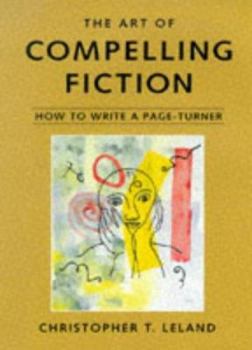The Art of Compelling Fiction
Christopher Leland demonstrates transforming ordinary stories into unforgettable ones. Writers are given new understanding of how to separate the one ingredient that propels a reader through a short... This description may be from another edition of this product.
Format:Hardcover
Language:English
ISBN:1884910300
ISBN13:9781884910302
Release Date:January 1998
Publisher:Story Press Books
Length:214 Pages
Weight:1.10 lbs.
Dimensions:0.9" x 6.3" x 9.3"
Customer Reviews
4 ratings
Not to Be Missed
Published by Thriftbooks.com User , 14 years ago
I have been writing fiction, off and on, for many years. When I was younger, I used to dream about becoming a published author, but the day-to-day activities of life in the real world prevented me from following up on this aspiration. After reading this book, I have decided to dust off that dream and start anew. While I was already familiar with many of the concepts and elements presented in the book, it was how the author discussed them that will stay in my memory for a very long time. What strikes me about this book is how different it is from all of the countless other how-to-write books I've read before. In this book, the author shows me how to combine the various elements and techniques of writing compelling fiction, rather than telling me. Since showing more and telling only when necessary is something we aspiring writers are told to do in so many books like this, it astounds me that so many authors of other how-to-write books rarely follow their own advice! Leland shows you what he means by peppering the book with excerpts from works published by numerous authors in a variety of genres, carefully selecting each passage to illustrate his points. While other authors will occasionally do this too, they just don't do it as well, in my opinion. In addition to this, Leland uses another technique to clarify his points, and to drive those points home. He does this by first asking you to imagine that you have witnessed something quite ordinary, perhaps some bicyclists passing you on a sidewalk while a man gets out of a parked car, or perhaps a conversation between two mechanics in a garage somewhere. He then asks you to consider what stories might be in progress that we didn't notice. Maybe the man is preparing to meet his girlfriend? Maybe the mechanic is talking about a hot date he's looking forward to? Maybe the man is John, a person we know who's had a rocky time in life. You know, John--that guy who lived next to your sister? The one whose girlfriend slit her wrists and died on his front lawn? By starting down these story lines one hypothetical at a time, the author made me feel like I was a co-writer, and that I was the one testing out possible plot developments, or that I was the one deciding whether John's diction should have a southern accent, or whether the dead girlfriend from his past should rear her ugly head through flashback or exposition. I felt very much connected with this process, and was surprised to see how much I cared about the story in progress. Leland makes the reader feel as though he were writing the story. Not only is this a difficult thing to pull off, but it is an extremely effective way to let his instruction sink into the brains of his readers. If, as a child, you were fortunate enough to have a teacher who taught you something without making you consciously realize that you were learning, then you understand what I am talking about here. This book, and its author, are good teachers. I have absorbed quite a
a very useful guide
Published by Thriftbooks.com User , 23 years ago
I have used The Art of Compelling Fiction in workshops and college courses. Since I've found it useful for my own writing, I have recommended it unhesitatingly to quite a few of my students.It does what a good reference book should do, which is to resolve an avalanche of information into coherent order, and it does so in conversational prose. That ain't too shabby.
Keep a journal and use what you record
Published by Thriftbooks.com User , 24 years ago
As a former colleague of Chris Leland, I know from whence I speak. Leland refers often to anecdotes that friends told him, articles from obscure newspapers, etc. and it all goes into his journal. Time passes, and that nugget re-appears in his novels. He gives many examples from his own work and precisely what he did to bring that item to life.The lesson to be learned is: Writers, you must always be on the alert to gather incidents, stories, characters, mannerisms, language and moments in time. Record them for subsequent use. And then, transform them and use them.
One of the Best
Published by Thriftbooks.com User , 25 years ago
This is one of the best books written about writing fiction. It's easy to read and understand. The exercises are priceless and extremely helpful. The author talks to you rather than at you. If you're going to be a writer, this is a book you should definately read.





